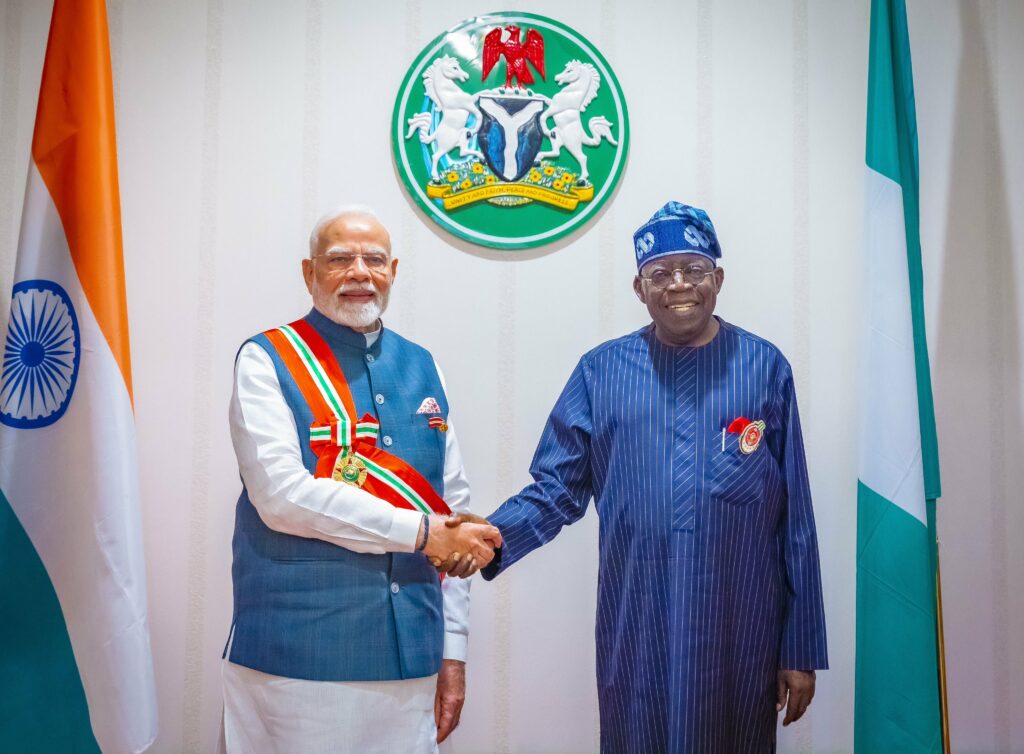In a momentous diplomatic engagement that marks a significant stride in Indo-Nigerian relations, Prime Minister Narendra Modi received Nigeria’s second-highest national honour, the Grand Commander of the Order of the Niger (GCON), from President Bola Tinubu during his visit to Abuja on Sunday. This historic visit, the first by an Indian Prime Minister in 17 years, culminated in substantial bilateral agreements and a renewed commitment to strengthening ties between the two nations.
The ceremonial welcome at the Presidential Villa set a grand tone for the day’s proceedings, with the Brigade of Guards mounting an impressive Guard of Honour whilst both nations’ anthems resonated through the grounds. The formal reception preceded intensive one-on-one discussions between the leaders, followed by comprehensive delegation-level talks that addressed wide-ranging bilateral issues.
During the substantive dialogue, both leaders demonstrated their commitment to elevating the strategic partnership across multiple sectors. Prime Minister Modi, emphasizing India’s prioritization of its relationship with Nigeria, offered his nation’s expertise in several crucial areas including agriculture, transportation, affordable medicine, renewable energy, and digital transformation. This gesture underscores India’s dedication to fostering meaningful development cooperation that creates tangible impact in local capacities, skills, and professional expertise.
The meeting yielded three significant Memoranda of Understanding (MoUs) covering cultural exchange, customs cooperation, and survey collaboration, laying the groundwork for enhanced bilateral engagement. These agreements reflect both nations’ determination to deepen their partnership across various domains, from security to economic cooperation.
In addressing shared challenges, both leaders reaffirmed their commitment to jointly combat terrorism, piracy, and radicalization. Modi specifically identified these issues, along with drug trafficking, as major challenges requiring coordinated action. This security-focused dialogue demonstrates the strategic depth of the Indo-Nigerian partnership and their shared vision for regional stability.
The economic dimension of the relationship received particular attention, with both sides acknowledging the substantial presence of over 200 Indian companies in Nigeria, representing investments of approximately $27 billion. These enterprises, serving as the second-largest employers after the federal government, exemplify the robust economic ties between the two nations. The existing development partnership, including concessional loans worth $100 million and capacity-building programmes, further illustrates the multifaceted nature of this bilateral relationship.
The approximately 60,000-strong Indian expatriate community in Nigeria, the largest in West Africa, received special mention during the talks. Modi expressed gratitude to President Tinubu for ensuring their welfare, recognizing their role as a vital bridge between the two nations. This human connection adds a unique dimension to the bilateral relationship, fostering people-to-people ties that complement governmental cooperation.
In a gesture of humanitarian solidarity, Modi announced India’s commitment to sending 20 tonnes of relief supplies for Nigerian communities affected by recent floods. This humanitarian assistance is a demonstration of India’s commitment to supporting Nigeria during challenging times and strengthens the bonds between the two nations.
The meeting also addressed broader international concerns, with both leaders discussing their roles in global forums. Tinubu acknowledged India’s efforts to amplify developing countries’ concerns through the Voice of the Global South summits, while Modi appreciated Nigeria’s leadership as chair of ECOWAS (Economic Community of West African States). The discussions touched upon Nigeria’s participation in international initiatives such as the International Solar Alliance and the International Big Cat Alliance, with Modi extending invitations for further collaboration in environmental protection efforts.
The elevation of the African Union to permanent membership in the G20 during India’s presidency received special mention, highlighting both nations’ commitment to enhancing Africa’s role in global governance structures. This development marks a significant step forward in ensuring more inclusive international decision-making processes.
This landmark visit builds upon the strategic partnership established during former Prime Minister Manmohan Singh’s visit in 2007, demonstrating the continuity and evolution of Indo-Nigerian relations. The relationship, which began even before Nigeria’s independence in 1960 when India established its diplomatic mission in Lagos, has grown into a partnership encompassing political, economic, cultural, and security dimensions.
Looking ahead, both nations have expressed their determination to explore new avenues for collaboration, particularly in emerging sectors such as renewable energy, digital technology, and defence cooperation. The discussion’s outcomes suggest a promising future for Indo-Nigerian relations, with both countries committed to realizing the full potential of their strategic partnership.

Leave a Reply